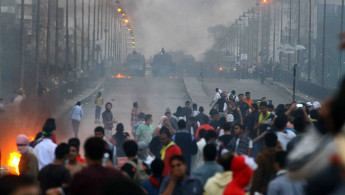National reconciliation in Egypt appears elusive
National reconciliation in Egypt appears elusive
As Egypt rejects an initiative from Qatar to mediate with Muslim Brotherhood - who reportedly reiterated a commitment to non-violence, political reconciliation in Egypt remains distant.
3 min read
Egypt rejected Qatar's offer as the country approaches the year anniversary of Rabaa massacre [AFP]
Egypt has rejected an offer by Qatar to mediate with the banned Muslim Brotherhood, who have been the focus of a government crackdown since a takeover by the military in 2013.
Foreign ministry spokesman Ahmed Abu-Zeid said on Sunday that Egypt does not accept any external interference in its internal affairs, and reitterated Egypt's designation of the Muslim Brotherhood as a "terrorist organisation".
Abu-Zeid said that "any third-party intervention or mediation is not acceptable." Egypt has however been welcoming of support from Saudi Arabia and the United Arab Emirates.
Qatari Foreign Minister Khalid bin Mohammed al-Attiyah told al-Araby al-Youm TV last week that Qatar is ready to act as a mediator "to bring viewpoints closer."
He added that Doha does not consider the Brotherhood to be terrorists and sees their status with the government as "a political dispute" that will delay Egypt's progress.
Ties between Doha and Cairo had been strained over Qatar's backing for Morsi, removed by a military coup in 2013.
It ended in a compromise in December, when Qatar said it would officially support the Egyptian government, though it still shelters leaders of the Muslim Brotherhood.
Doha continues to advocate reconciliation between the Islamist organisation and the Egyptian parliament.
In June, Qatar expressed "deep concern" over the death sentences issued to former Egyptian president, Mohammad Morsi.
Is national reconcilliation still on the cards?
Earlier this month, Dr. Mohammad Ghoneim, an advisor to the Abd al-Fattah al-Sisi said that hostilities between the Egyptian government and the Muslim Brotherhood could cease in the foreseeable future.
"National reconciliation will happen at some point, but the Brotherhood will first have to stop resorting to violence and apologise to the Egyptian people for the crimes they have committed," he said.
"In my personal opinion, I think in the end it's possible presidential pardons will be issued that commute the [Brotherhood leader's] death penalties to life sentences."
However, on Sunday, a court in Minya sentenced six Muslim Brotherhood supporters to death in connection to the military's clearing of Rabaa square that killed at least 900 people.
The news also comes as the Muslim Brotherhood have reportedly been shifting personal within the top leadership positions, including a promotion of Ibrahim Mounir, who is said to be opposed to the revolutionary approach of the Brotherhood.
Sources told al-Araby al-Jadeed's Arabic section that "it was a solution to the leadership crisis in the group about two months ago and caused an organisational crisis described by observers as the largest in decades."
This crisis was fuelled by a manifesto written by Mahmoud Ghozlan which reiterated the Muslim Brotherhood's commitment to a peaceful approach.
It was hoped that this step would dissuade the regime from carrying out further violent actions against opponents, as and aid the "international community's" attempts to resolve the political crisis in Egypt.
The manifesto elicited an angry reaction from the group's younger members, many of whom are said to favour a "revolutionary" approach, which some say might involve arms.
The current Brotherhood are said to be discussing the article in question.
However, Egypt's outright rejection of a Qatar initiative appears to suggest that any reconcilliation between the Egyptian government and the Muslim Brotherhood will remain a distant possibility.



